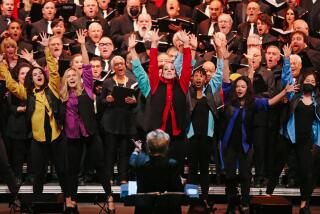Baritone to Fulfill a Wish: ‘Belshazzar’s Feast’
The odds were stacked against baritone David Pittman-Jennings building a career as a professional musician, coming as he did from a Midwestern environment in which serious music was not a part of his childhood.
But with a schedule these days that includes guest work with groups such as the Pacific Chorale, with which he will sing Friday at the Orange County Performing Arts Center, and numerous performances in Europe, Pittman-Jennings says he has been able to reach career goals because “the right doors open at the right time and the wrong doors close.”
That may make the road sound a lot shorter and smoother than it was.
The Oklahoma-born singer’s introduction to music came from his family’s amateur involvement in Nazarene Church music. Public school provided the only other outlet for a musically inclined adolescent, and Pittman-Jennings gravitated toward instrumental music education. He didn’t start singing until his senior year in high school.
The singer, 38, laughingly says that his former band and choral directors still do not speak to each other because of the conflict they perceived between his vocal and instrumental studies. But with characteristic can-do attitude, their star pupil enrolled at the University of Oklahoma intending to complete a double degree in oboe and voice.
His draft board, however, had other ideas. With the country in the midst of the Vietnam War, he was given four undergraduate years in which to complete his degree. That dictated a single major in oboe, the program nearest completion.
Two-and-a-half years of Army life in San Antonio afforded ample opportunity for singing. In fact, ever since becoming acquainted with Walton’s “Belshazzar’s Feast” while singing in the chorus with the San Antonio Symphony Master Singer Chorale, Pittman-Jennings has hoped to sing the baritone role. “It’s a moving piece (that) speaks to the audience, so I have always wanted to do it.”
On Friday night, he will fulfill that wish when he joins John Alexander and the Pacific Chorale in “Belshazzar’s Feast” for the chorale’s season opener. He will also take the baritone role in Brahms’ “Triumphlied.”
Of the Walton piece, Pittman-Jennings said: “One of the biggest challenges is not necessarily a musical challenge for me, but (arises) because I sing so little in English. . . . I think (that) is true for any singers when they are working in their own language, because you cannot sing a language as you would speak it. So naturally, one of the biggest challenges any time I sing a work in English is getting past the language to the music.”
Friday’s performance is not Pittman-Jennings’ first meeting with John Alexander. After his stint in the Army, and with several small competitions under his belt, Pittman-Jennings gave himself 1 year to test his mettle as a singer. In 1972, he left the University of Oklahoma’s MA program in oboe to follow his voice teacher of five years to California State University at Northridge, where he met Alexander and began a longstanding mutual professional admiration.
Pittman-Jennings has resided in Europe since 1977, when first place in the Loren Zachary competition resulted in a two-year contract with the Graz Opera in Austria.
The German system, under which a single role might be sung two or three times over a 2-year period after five or six weeks of rehearsal, presented him with an opportunity to spend extensive time with nearly a dozen roles.
This exhaustive method of building repertory continued for 2 more years in Bremen, West Germany. Though valuable, the period also included some uncomfortable moments in which the baritone refused roles for which he wasn’t ready. In 1981, he decided to relocate to Paris as a free-lance singer.
Pittman-Jennings attributes a sense of inner peace--”If you’re at peace with yourself, then you’re in harmony with the universe”--for his ability to cope with a concert and operative schedule that sends him scurrying around the globe. One day after he returns home from the Southland, he will embark on a European tour of performances as disparate musically as they are geographically: Debussy’s “L’Enfant Prodigue” in Madrid, Berg’s “Wozzeck” with Opera of Parma and Opera of Modena, and Strauss’ “Ariadne auf Naxos” with Opera of Lyon, among others.
Despite all the travel, Pittman-Jennings says he never gets nervous about performing. With a daily three-hour practice, a regime of bed by 10:30 p.m., up by 7 a.m., and regular exercise, he says: “I know my music, know my vocal limitations, know how the body and the voice are that day. I am in control of everything I need to be in control of.”
John Alexander will conduct the Pacific Chorale and Pacific Symphony in music by Brahms, Walton and Persichetti at 8 p.m. Friday at the Orange County Performing Arts Center, 600 Town Center Drive, in Costa Mesa. Featured soloist will be baritone David Pittman-Jennings. Tickets: $12.50-$40. Information: (714) 542-1790.
More to Read
The biggest entertainment stories
Get our big stories about Hollywood, film, television, music, arts, culture and more right in your inbox as soon as they publish.
You may occasionally receive promotional content from the Los Angeles Times.










